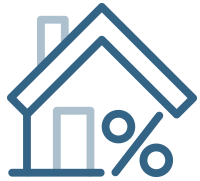
Consider Your Finances
 How Much Can You Afford?
How Much Can You Afford?
To secure your new home, you will likely need to arrange for a mortgage. But, before you do, take a look at how much you can afford a month. Based on your income and expenses, this affordability calculator can help you estimate your maximum affordable mortgage payments.
Once you have used the affordability calculator to estimate your maximum monthly total, you can compare this number to the mortgage payments for specific loan amounts. Enter the loan amount in this mortgage calculator and the monthly principal and interest will be calculated for you.
You now know how much you can afford a month. What’s next?
Get pre-approved for a mortgage. There are many banks, credit unions and lenders out there who would love your monthly mortgage payments. So, talk to as many as you can and don’t hesitate to negotiate. Chris is very knowledgeable about the different types of mortgages and can offer advice based on your needs and comfort level.
Call a mortgage broker. Mortgage brokers are another great resource. Their job is to find low lending rates and they usually don’t get paid until you sign a mortgage with them. This means they are highly motivated to get you the best deal.
The mortgage lender that you choose will help guide you through mortgage pre-approval process and will answer any questions you may have.
What Extra Costs Do You Need to Consider?
Appraisal Fee. Your mortgage lender may need to have your new home appraised by a professional and they will often pass the bill onto you. Sometimes your lender will waive this fee.
Mortgage broker’s fee. Your mortgage broker may charge a fee that’s payable on your closing date. Ask your broker to avoid any surprises.
Land survey fee. Mortgage lenders may require a survey of your property, even if there is an existing survey. Your lawyer can assist if required.
Home inspection fee. A home inspection is intended to help avoid surprises and protect yourself and your investment. There are now several types of home inspections (e.g. home, radon gas, well, septic, municipal sewer line to name a few).
Home insurance. Mortgage lenders require you to carry property insurance because your home is their security against the mortgage. Often you can have these payments added to your monthly mortgage payments. Shop around.
Title insurance. While not mandatory, it protects you from fraud and potential errors surrounding the title of your land. Ask your lawyer for details.
Legal fees. You’ll pay your lawyer for their time and “disbursements” which are costs covered in title searches, and preparing all legal closing documents.
Adjustments. The previous owner may have paid property tax or utilities in advance and they will want to be credited for those payments. Ask your lawyer what may come up on your closing date.
Deed transfer tax. This amount of tax varies from province to province and municipality to municipality. For homes in the Halifax area, deed transfer tax is 1.5% of the purchase price of the home. This tax is paid at closing and will be reviewed with your lawyer.

